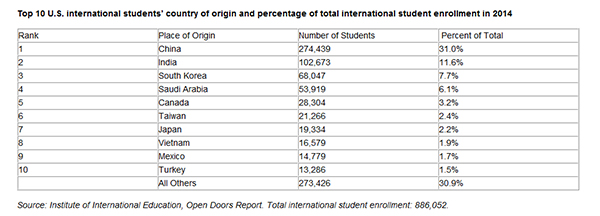What Chinese students really need?
By Zhong Bu (CRIENGLISH.com) Updated: 2015-09-30 15:15
The trend is not new. According to Bloomberg Businessweek, CNW Marketing Research found that Chinese students in the U.S. purchased about $15.5 billion in new and used cars between January 2012 and October 2013, more than three times higher than a comparable group of American students who spent about $4.7 billion on vehicles in that period. Meanwhile Chinese students who bought new cars spent an average of $53,000, with 32 percent paying cash, while American students surveyed spent an average of $19,000 on a new car, with fewer than 5 percent paying cash.
The wealthy of some Chinese students has surely caught the attention of luxury brands eager to capitalize on them. Forbes reported that Bergdorf Goodman, a luxury department store in New York City sponsored Chinese New Year celebration at two major universities in town – New York University and Columbia University. In downtown Chicago, Bloomingdales put on a special fashion for Chinese students last year, where invited Chinese students checked out the latest fashions modeled by and for Chinese students, while sipping cucumber cocktails.
What concerns me more is not what cars Chinese students drive or what brand name handbags they use, but their academic performance. Don't get me wrong: most Chinese students I know are very hardworking and academically successful. But some of them may not take full advantage of free flows of information on U.S. campuses and equip themselves with new insights and knowledge. For example, some Chinese seniors ask questions with answers easily available in the course management system, libraries or the university's website. It is always good to ask questions, but some of the questions suggest the student does not know how to conduct basic information search, leaving alone information processing.
A U.S. university just likes an open book, and you will have to open it to learn what it covers. In the digital age, U.S. universities are more easily accessible than an open book as all the information a student needs is just a mouse click away. Chinese students are good at following their professors' instructions. But more importantly, they must cultivate motivation for self-learning, in which information processing plays a pivotal role. When a student does not know how to search for related information and process it, one may never know how to use what's learned innovatively and creatively. What's worse, the student may end up with a twisted account of reality about himself and the outside world.
Poor information processing may eventually lead to "systematically distorted communication," which is the top challenge the world faces in the 21st century, according to German philosopher Jürgen Habermas. Being an international student in a different culture, it is important to invest time and effort in sharpening one's information processing capability because it is the major step not only to academic success but to life success as well.
The author, Dr. Zhong Bu, Associate Professor from College of Communications, Pennsylvania State University.











